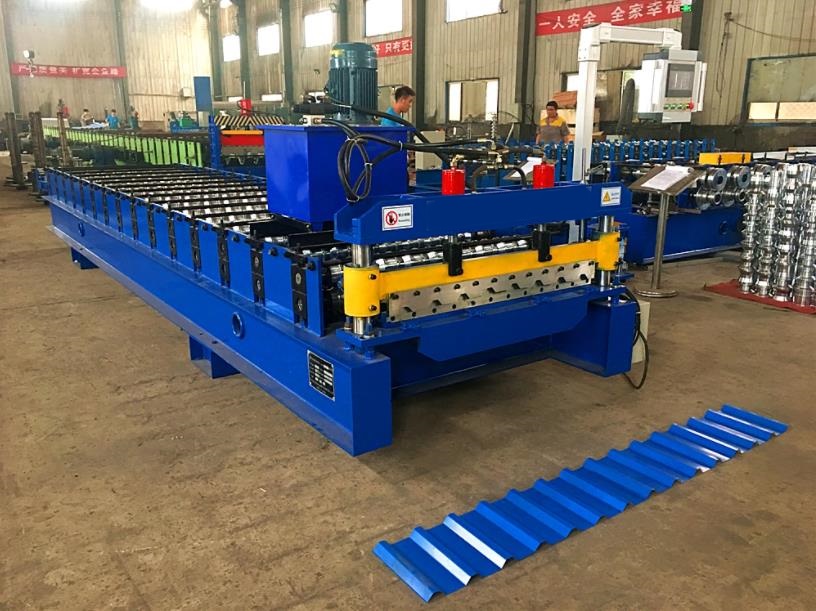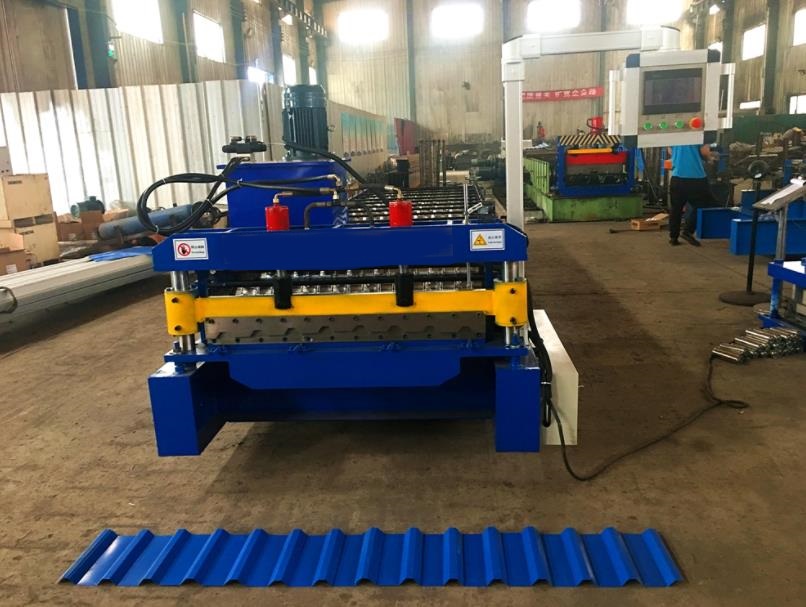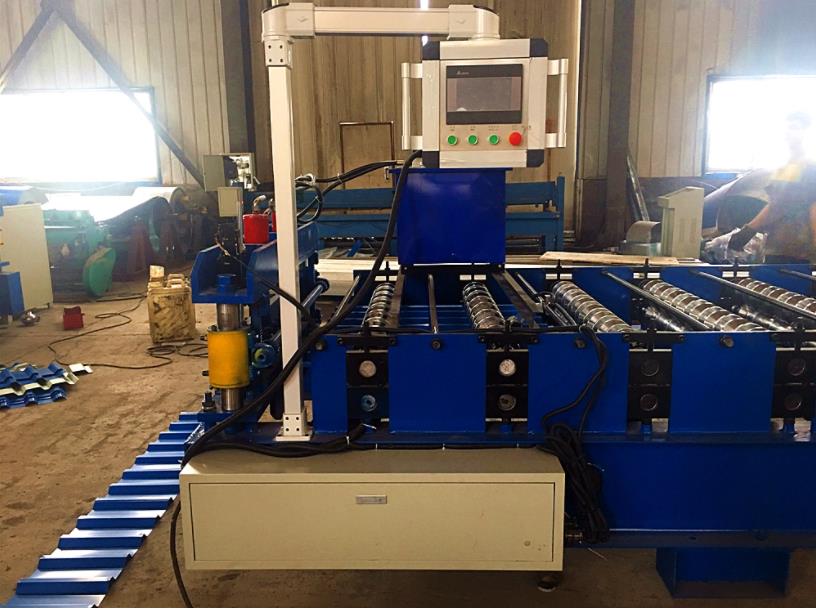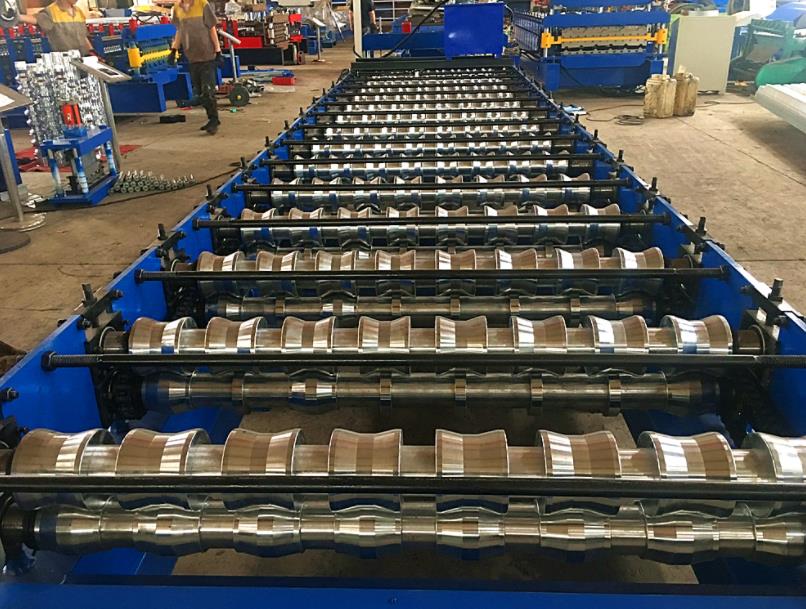Chile PV8 Roof Panel Forming Machine - Precision PT825 Panel Production
Industry Trends in Metal Roll Forming for Roofing Panels
The global construction industry is experiencing dynamic shifts, with a growing emphasis on efficiency, sustainability, and durability. Metal roofing, particularly solutions produced by advanced roll forming machinery, is at the forefront of this evolution. Key trends include the adoption of high-strength, lightweight materials such as galvanized steel, Aluzinc, and pre-painted steel, driven by the need for enhanced structural integrity and reduced maintenance costs. Automation and Industry 4.0 integration are transforming manufacturing processes, leading to increased precision, faster production cycles, and reduced labor dependency. There is a strong market pull towards customized panel profiles that cater to specific aesthetic and functional requirements, from intricate architectural designs to robust industrial applications.
Furthermore, energy efficiency standards are influencing product design, with metal panels contributing to cool roof technologies and solar panel integration. The demand for reliable, high-output machinery that can consistently produce quality profiles, such as the Chile PV8 Roof Panel forming machine pt825 panel, is therefore on a steady upward trajectory. Emerging markets, especially in Latin America and Southeast Asia, are seeing rapid urbanization and infrastructure development, fueling significant investment in modern roofing solutions.
Detailed Process Flow: Manufacturing and Operation
Manufacturing Process of the Machine Itself
The production of a sophisticated machine like the Chile PV8 Roof Panel forming machine pt825 panel involves stringent engineering and quality control measures. It commences with material selection, primarily high-grade structural steel (e.g., Q235, Q345) for the main frame and base, ensuring robust stability and vibration resistance during operation. Rollers are crafted from high-carbon steel (e.g., GCr15), subjected to advanced heat treatment processes like quenching and tempering to achieve a Rockwell hardness (HRC) of 58-62, followed by precision CNC machining and hard chrome plating (typically 0.05mm thickness) for superior wear resistance and surface finish.
- Frame Fabrication: Steel plates are cut, drilled, and welded using automated robotic welding for consistency and strength, adhering to AWS D1.1 structural welding codes.
- Component Machining: Shafts, gears, and other critical precision components undergo multi-axis CNC machining, maintaining tolerances within ±0.01mm, vital for the accuracy of the final panel profile.
- Heat Treatment and Surface Finishing: Rollers and cutting dies are heat-treated, ground, and polished. The hard chrome plating enhances corrosion resistance and reduces friction, extending tool life.
- Assembly and Alignment: Experienced technicians assemble the machine, meticulously aligning the roll stands, cutting dies, and guiding systems. Laser alignment tools are used to ensure parallelism and perpendicularity, critical for consistent panel quality.
- Electrical and Control Integration: PLC (Programmable Logic Controller) systems from reputable brands (e.g., Siemens, Panasonic) are integrated, along with human-machine interface (HMI) touchscreens for intuitive operation. Wiring is performed to CE and UL standards.
- Testing and Quality Assurance: Each machine undergoes rigorous functional testing, including multiple material runs, dimensional accuracy checks of the produced panels, speed verification, and emergency stop system validation. Noise levels and power consumption are also monitored, ensuring compliance with ISO 9001 and CE directives. Service life is projected for over 15 years with proper maintenance, reflecting the high-quality components and robust construction.
Operational Process of the Chile PV8 Roof Panel forming machine pt825 panel
The roll forming process executed by the Chile PV8 Roof Panel forming machine pt825 panel is a highly automated and efficient method for producing roofing panels. Target industries include residential, commercial, agricultural, and light industrial construction, where robust, weather-resistant, and aesthetically pleasing roofing solutions are required.
- Material Decoiling: A coil of pre-selected material (e.g., pre-painted galvanized steel, Aluzinc, aluminum) is loaded onto a hydraulic or manual decoiler. The decoiler feeds the strip into the machine at a controlled speed.
- Guiding and Leveling: The material passes through a precision guiding system that ensures correct alignment, preventing side-to-side movement. A leveling device may be integrated to flatten any coil set or curvature, preparing the strip for accurate forming.
- Roll Forming Stages: The core of the machine consists of numerous forming stations (typically 12-18 stations for complex profiles like the PV8). Each station progressively shapes the metal strip into the desired PV8 panel profile using a series of precisely engineered rollers. The gradual deformation minimizes stress on the material, ensuring profile integrity and preventing material fatigue.
- Cutting to Length: Once the material has been fully formed, it moves to a hydraulic or electric shearing station. Based on pre-programmed lengths set in the PLC, the flying shear precisely cuts the continuous panel without stopping the forming process, maximizing output efficiency.
- Output and Stacking: The finished panels are then conveyed to an output table or an automatic stacking system, ready for packaging and transport.

Schematic of a typical roll forming machine setup.
Advantages in Typical Application Scenarios:
- Energy Saving: The continuous, low-friction roll forming process is significantly more energy-efficient than traditional stamping or bending methods. Modern servo motor controls further optimize power consumption.
- Corrosion Resistance: By processing pre-coated materials (e.g., galvanized, Aluzinc, PVDF-coated steel), the machine enables the production of panels with inherent superior corrosion resistance, crucial for coastal regions, industrial environments (petrochemical facilities), and agricultural buildings.
- High Structural Integrity: The precision of the roll forming ensures consistent panel geometry, critical for effective interlocking and uniform load distribution, leading to roofs with excellent wind uplift resistance and snow load capacity. This is particularly valuable in infrastructure projects in metallurgy and water supply & drainage facilities requiring robust cover.
- Reduced Waste: Optimized material utilization through precise cutting and minimal scrap generation contributes to environmental sustainability and cost savings.
Technical Specifications of the Chile PV8 Roof Panel forming machine pt825 panel
Understanding the technical parameters is crucial for evaluating the performance and suitability of roll forming machinery. The Chile PV8 Roof Panel forming machine pt825 panel is engineered to deliver high performance and reliability.

Precision engineering of roll forming stations.
Product Specification Table
| Parameter | Specification |
|---|---|
| Machine Model | PV8-PT825 |
| Formed Panel Width | 825 mm |
| Material Width (Coil) | 1000 mm (typical) |
| Material Thickness Range | 0.3 - 0.7 mm |
| Forming Speed | Up to 15-20 m/min (adjustable) |
| Number of Forming Stations | 16-18 stations |
| Main Motor Power | 7.5 kW - 11 kW (depending on configuration) |
| Hydraulic Power for Cutting | 4 kW - 5.5 kW |
| Control System | PLC with Touch Screen HMI (Siemens/Panasonic optional) |
| Roller Material | GCr15 Steel, Quenched HRC58-62, Hard Chrome Plated |
| Shaft Diameter | Φ70-80 mm (Solid Steel) |
| Machine Dimensions (L x W x H) | Approx. 7.5m x 1.5m x 1.4m (excluding decoiler) |
| Total Weight | Approx. 5,000 - 7,000 kg |
| Input Voltage | 380V/50Hz/3Phase (customizable) |
Application Scenarios and Technical Advantages
The versatility and robustness of the panels produced by the Chile PV8 Roof Panel forming machine pt825 panel make it ideal for a multitude of industrial and commercial applications.
Key Application Scenarios:
- Industrial Buildings: Factories, warehouses, and production facilities benefit from the large spanning capabilities and high load-bearing capacity of PV8 panels. Their quick installation minimizes downtime for industrial operations.
- Commercial Complexes: Shopping malls, exhibition centers, and office buildings leverage the aesthetic appeal and long lifespan of pre-painted metal roofing.
- Agricultural Structures: Barns, livestock shelters, and storage facilities require durable, weather-resistant roofing that can withstand harsh environmental conditions. The corrosion resistance of panels made from galvanized or Aluzinc steel is a significant advantage.
- Infrastructure Projects: Bus terminals, train stations, and public utility buildings demand robust and low-maintenance roofing solutions.
- Residential Developments: While primarily industrial, these panels are increasingly used in modern residential designs seeking durability and contemporary aesthetics.
Technical Advantages:
- Precision Forming: The multi-station design ensures precise and consistent panel profiles, eliminating stress marks and ensuring perfect panel interlocking. This adherence to tight tolerances (typically ±0.5mm for width, ±1mm for length) guarantees leak-proof roofs.
- High-Speed Production: Optimized roll tooling and advanced cutting mechanisms allow for production speeds up to 20 m/min, significantly increasing output and project turnaround times.
- Material Versatility: Capable of processing various coil materials, including galvanized steel, Aluzinc, aluminum, and pre-painted steel, allowing for diverse application requirements and budgets.
- Durability and Longevity: The robust construction of the machine itself, coupled with the ability to form high-quality, corrosion-resistant panels, ensures an extended service life for both the equipment and the end product. Panels can withstand extreme weather conditions, UV radiation, and chemical exposure, offering a service life exceeding 30 years depending on the coating.
- User-Friendly Operation: The integrated PLC control system with HMI offers intuitive operation, fault diagnosis, and production parameter adjustments, reducing the need for highly specialized operators.

User-friendly HMI for precise control.
Vendor Comparison and Customized Solutions
When investing in a roll forming machine, a thorough comparison of vendors and their offerings is essential. Key differentiators often lie in machine build quality, control system sophistication, post-sales support, and customization capabilities.
Comparative Analysis: Chile PV8 Roof Panel forming machine pt825 panel vs. Generic Competitor
| Feature/Parameter | Chile PV8 Roof Panel forming machine pt825 panel | Generic Competitor (Example A) |
|---|---|---|
| Roller Material & Treatment | GCr15, Quenched (HRC58-62), Hard Chrome Plated | 45# Steel, only quenched or basic plating |
| Control System Reliability | PLC (Siemens/Panasonic) with advanced HMI for diagnostics | Basic PLC, limited diagnostics, less intuitive HMI |
| Cutting Mechanism | Hydraulic Flying Shear, Post-cut | Mechanical or pre-cut shear, potentially lower accuracy |
| Frame Construction | Welded structural steel, precision-machined | Bolted frame, less rigidity over time |
| Production Speed (m/min) | 15-20 m/min | 10-12 m/min |
| Dimensional Accuracy | Length ±1mm, Width ±0.5mm | Length ±2mm, Width ±1mm |
| Warranty (Main Components) | 24 months | 12-18 months |
Customized Solutions:
Understanding that projects have unique demands, manufacturers of the Chile PV8 Roof Panel forming machine pt825 panel offer comprehensive customization options to perfectly match operational requirements. These include:
- Profile Adaptation: While the PV8-PT825 is a standard profile, tooling can be designed for specific local profiles or unique architectural panel requirements. This involves precise CAD modeling and CNC machining of new roller sets.
- Material Handling: Integration of advanced decoilers (e.g., heavy-duty hydraulic decoilers for larger coil capacities up to 15 tons), automatic loading systems, and stacking units.
- Speed and Production Volume: Optimization of motor power, gear ratios, and control algorithms to achieve higher output speeds for large-scale production facilities.
- Control System Upgrades: Integration with higher-level plant management systems (SCADA), remote monitoring capabilities, and advanced diagnostic features for Industry 4.0 environments.
- Safety Features: Custom safety guarding, emergency stop protocols, and light curtains to meet specific regional safety standards (e.g., OSHA, Machinery Directive 2006/42/EC).
- Multi-Functionality: Possibility of incorporating additional features like perforating units or crimping stations for specialized panel designs.

Robust output section and material stacking.
Application Case Studies and Customer Experience
Real-world application demonstrates the reliability and performance of the Chile PV8 Roof Panel forming machine pt825 panel. Our commitment to quality and client success is reflected in successful projects globally.
Case Study 1: Large-Scale Industrial Warehouse, Santiago, Chile
A leading logistics company in Santiago, Chile, required a roofing solution for a new 50,000 sqm distribution center. The project demanded rapid installation, high durability against seismic activity, and excellent thermal performance. They selected our Chile PV8 Roof Panel forming machine pt825 panel for on-site production of galvanized steel PV8 panels. By producing panels directly at the construction site, the client minimized transportation costs and reduced lead times by approximately 30%. The machine's consistent output of precise 825mm wide panels ensured a seamless installation. The client reported significant savings in labor and material handling, alongside high satisfaction with the structural integrity and aesthetic finish of the roofing system.
Case Study 2: Agricultural Complex Expansion, Rural Peru
An agricultural cooperative in rural Peru needed to expand its storage and livestock facilities. The main challenges included corrosive environmental conditions from animal waste and high humidity, as well as the need for a cost-effective and low-maintenance solution. Our partner deployed the Chile PV8 Roof Panel forming machine pt825 panel to produce Aluzinc PV8 panels on a mobile setup. The superior corrosion resistance of Aluzinc, combined with the robust profile, provided an ideal solution. The machine's reliability in a remote setting and its ease of operation were highlighted by the project managers. The panels provided excellent protection, contributing to a healthier environment for livestock and preserving stored goods, exceeding the cooperative's expectations for longevity and performance.
Customer Feedback Excerpt:
"The Chile PV8 Roof Panel forming machine pt825 panel we acquired has been a game-changer for our manufacturing operations. Its consistent output, minimal maintenance requirements, and the excellent support from the vendor have significantly boosted our production efficiency and product quality. We've seen a measurable improvement in client satisfaction due to the superior finish and durability of the panels." - Operations Director, Major Construction Material Supplier, Brazil
Trustworthiness and Support Information
Certifications and Quality Assurance:
Our manufacturing processes adhere strictly to international quality management systems, notably ISO 9001:2015. Components are sourced from certified suppliers, and final products undergo rigorous testing to meet CE and relevant industry standards. Our commitment to excellence is reflected in our robust internal quality control (IQC) and final product inspection (FPI) protocols, which cover material integrity, dimensional accuracy, electrical safety, and functional performance.
Frequently Asked Questions (FAQ):
- Q: What is the typical lead time for the Chile PV8 Roof Panel forming machine pt825 panel?
- A: Standard configurations typically have a lead time of 45-60 working days from order confirmation and deposit. Customized solutions may require an additional 15-30 days for design and fabrication.
- Q: What warranty is provided with the machine?
- A: We offer a standard 24-month warranty on mechanical components and 12-month warranty on electrical components from the date of shipment. Consumable parts are excluded. Extended warranty options are available upon request.
- Q: What kind of after-sales support is offered?
- A: Our comprehensive after-sales support includes 24/7 technical assistance via phone/email, remote diagnostics, and on-site engineer dispatch for complex issues. We also provide extensive operational training for your personnel, both remotely and during installation.
- Q: Can the machine produce other panel profiles?
- A: The Chile PV8 Roof Panel forming machine pt825 panel is specifically designed for the PV8-PT825 profile. To produce different profiles, a new set of roller tooling would be required, which can be custom-designed and manufactured.
Logistics and Fulfillment:
We manage worldwide shipping logistics, offering various incoterms (FOB, CIF, EXW, DDP) to suit client preferences. Each machine is carefully disassembled for transport, securely packed in seaworthy container111s, and accompanied by detailed packing lists and installation manuals. Our team provides support through customs clearance and delivery to your site.
Customer Support:
Our dedicated customer support team is available to assist with technical queries, spare parts orders, and service requests. We maintain a comprehensive inventory of critical spare parts to ensure minimal downtime for our clients. Regular maintenance guides and preventative service schedules are also provided to optimize machine performance and longevity.
References
- ISO 9001:2015 - Quality management systems — Requirements. International Organization for Standardization.
- European Parliament and Council. Directive 2006/42/EC of 17 May 2006 on machinery. Official Journal of the European Union, L 157/24.
- Metal Construction Association. Metal Roofing & Wall Panels. Retrieved from metalconstruction.org.
- Roland, A. (2014). The History of Roll Forming. Fabricator. Retrieved from thefabricator.com.
- ASTM International. (2020). Standard Specification for Steel Sheet, Zinc-Coated (Galvanized) or Zinc-Iron Alloy-Coated (Galvannealed) by the Hot-Dip Process. ASTM A653/A653M.
-
Corrugated iron roofing sheet making machine with CE, AutoNewsNov.17, 2025
-
3mm Steel C U Channel Roll Forming Machine, Heavy DutyNewsNov.17, 2025
-
Calamima Micro Ondulada corrugated roof sheet machine - CNCNewsNov.17, 2025
-
Metal Roofing Roll Former for Sale Companies - Fast, PreciseNewsNov.17, 2025
-
Drywall Steel L Angle Bar forming machine | Fast, PreciseNewsNov.17, 2025
-
Corrugated Iron Roofing Sheet Making Machine, Fast & DurableNewsNov.11, 2025
-
Corrugated Metal Roofing Machine | High-Speed, Precise, CENewsNov.11, 2025







